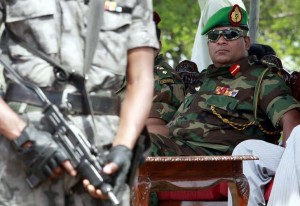Rajapakse summons: Command responsibility and jurisdiction under Intl humanitarian law
‘As for the ways by which rulers over others may become implicated in their crimes, there are two. tolerance and protection….we must hold that a person who knows of a crime and is able and bound to forbid it and does not do so, himself commits a crime … the people or the king are not rigidly bound to surrender the offender, but they must either surrender or punish him.’
GROTIUS (1652).as quoted in Cherif Bassouni -International Criminal Law (3rd Edition 2008)
The origins of command responsibility date back centuries. In the 6th century B.C., Sun Tzu in his Ping Fa- ‘The Art of War’ wrote about the duty of army commanders to ensure that their subordinates conducted themselves in a civilized manner in armed conflict.(see Wikepedia-the free encyclopedia).In 1439,Charles VII of France issued the Ordinance of Orleans, which imposed blanket responsibility on commanders for all unlawful acts of their subordinates. Although the tribunal did not entirely rely on command responsibility the first international recognition of the concept occurred in the trial of Peter Von Hagenbach in the days of the Holy Roman Empire .
During the US Civil War, the US Government worked with Professor Alfred Lieber of the University of Columbia to codify the rules governing warfare. Article 71 of General Orders No. 100 ,’Instructions for the Government of Armies of the United States in the Field’, known as the ‘Lieber Code’ imposed criminal liability on commanders for ordering or encouraging soldiers to wound or kill already disabled enemies. The first attempt at international level to codify the principle of command responsibility was the Hague Convention (IV) of 1907 ‘Respecting the Laws and Customs of War on Land’. Article 1 of the Annex to the Convention stated that an armed force had to be commanded by a person responsible for his subordinates, but did not further detail the particular obligations of the commanders.
The Additional Protocol I (‘API’) of 1977 to the Geneva Convention of 1949 was the first international treaty to comprehensively codify the doctrine of command responsibility. Article 86(2) states the fact that a breach of the Convention of this Protocol was committed by a subordinate does not absolve his superiors from responsibility if they knew, or had information which should have enabled them to conclude in the circumstances at the time, that he was committing or about to commit such a breach and ‘if they did not take all feasible measures within their power to prevent or repress the breach’.
Article 87 requires a commander to ‘prevent and where necessary ,to suppress and report to competent authorities’ any breaches of the Conventions and of the Additional Protocol I(‘API’).It should be noted that Article 86(2) explicitly addresses the knowledge factor of command responsibility. There is an ongoing debate as to whether this knowledge factor found in Article 86(2) can be interpreted to include a stricter ‘should have known’ mens rea (guilty intention) standard.
The statutes of the two tribunals established by the UN Security Council, The International Criminal Tribunal for the former Yugoslavia (ICTY) and The International Criminal Tribunal for Ruwanda (ICTR) further developed the doctrine of command responsibility in International Humanitarian Law.
The doctrine of command responsibility has recently been codified in Article 28 of the Rome Statute of the International Criminal Court (ICC). Article 28(a) imposes individual responsibility on military commanders for crimes committed by forces under their effective command
and control if they either knew or owing to the circumstances at the time, ‘should have known’ that the forces were committing or about to commit such crimes. Thus, literally interpreted Article 28(a) of the Rome Statute imposes a stricter standard of knowledge than Article 86(2) of the Additional Protocol I (‘API’) of 1977 to the Geneva Convention.
No jurisdiction
Sri Lanka is not a State Party that has ratified or acceded to the Rome Statute. Therefore the International Criminal Court has no jurisdiction over the territory of Sri Lanka . Article 12(1) of the Rome Statute under ‘Precondition to the exercise of jurisdiction’ states: ’A State which becomes a Party to this Statute thereby accepts the jurisdiction of the Court with respect to crimes referred to in Article 5’. Article 5.1 of the Statute grants jurisdiction to investigate (a) crimes of genocide, (b) crimes against humanity,(c) war crimes and (d) crime of aggression.
In a recent interview with the Australian published in LankaNewspapers.com web site on 18th July 2011, the President of the ICC Hon.Sang Hyun Song has stated that the Court has no jurisdiction with respect to Sri Lanka without a reference to the Court by the UN Security Council. A further obstacle is that the Court’s jurisdiction as it stands at present does not extend to matters related to terrorism.
The US Government under the Bush Administration adopted the American Service-members’ Protection Act (ASPA) in an attempt to protect any US citizen from appearing before the ICC. The ASPA is a United States federal law introduced by US Senator Jesse Helms as an amendment to the National Defense Authorization Act and passed in August 2002 by Congress. The stated purpose of the amendment was “to protect United States military personnel and other elected and appointed officials of the United States government against criminal prosecution by an international criminal court to which the United States is not a party”. It authorizes the President to use “all means necessary and appropriate to bring about the release of any US or allied personnel being detained or imprisoned by, on behalf of, or at the request of the International Criminal Court”. This has led to the nickname The Hague Invasion Act since such freeing of US citizens by force might only be possible through an invasion of The Hague, Netherlands, the seat of several international criminal courts and the seat of the Dutch government. The Act prohibits federal, state and local governments and agencies (including courts and law enforcement agencies) from assisting the Court. For example, it prohibits the extradition of any person from the United States to the Court; it prohibits the transfer of classified national security information and law enforcement information to the Court; and it prohibits agents of the Court from conducting investigations in the United States.(Wikepedia) The said Act interferes with the application or implementation of the principle of command responsibility when applied to US citizens.
It was reported in the media 25th September 2011 that a federal civil suit had been filed in the Southern Manhattan District Court of the United States by the American University Washington College of Law’s Human Rights Impact Litigation Clinic on behalf of Vathsala Devi and Seetharan Sivam, two Sri Lankan Tamils under the Alien Tort Claims Act seeking compensation for damages for the emotional trauma caused by the death of family members(including Thurairajasingham Devi better known as ‘Colonel Ramesh’ of the LTTE) who were alleged to have been tortured and killed. Summons issued by the District Judge had been served on Major General Shavendra Silva, Sri Lanka ’s Acting Permanent Representative to the United Nations at his residence in New York . It must be noted that the suit does not incorporate a criminal charge but a civil suit claiming monetary relief. The claim is based on the command responsibility of Major General Shavendra Silva, who was the Commander of the 58th Brigade. The Foreign Sovereign Immunity Act prohibits action on non commercial matters against foreign states. The lawyer Ali Beydoun for the plaintiffs said that the defence would have to argue the matter of diplomatic immunity accorded to General Shavendra Silva, in court.
It was also reported in local and international media that a law suit based on command responsibility has been filed in the United States District Court of Columbia under the Torture Victims Protection Act TVPA) and attempts have been made to serve summons on H.E.Mahinda Rajapakse President of Sri Lanka. The TVPA has been used by victims of terrorism to sue foreign states that have been designated by the U.S. as state sponsors of terrorism, such as Iraq (which has since been removed from the list) and Iran . See Daliberti v. Republic of Iraq , 97 F.Supp.2d 38 (D.D.C. 2000); Weinstein v. Islamic Republic of Iran , 184 F.Supp.2d 13 (D.D.C. 2002). The Foreign Sovereign Immunity Act (FSIA), 28 U.S.C. §§ 1602–1911, prohibits foreign states from being sued in U.S. courts for most non-commercial issues. Thus under the Foreign Sovereign Immunities Act of 1976 of the United States, it is extremely doubtful that a foreign Head of State can be issued with summons by a US Court on non commercial matters.
In 2008, the FSIA was invoked by Saudi Arabia to preclude a lawsuit filed by families and victims of the September 11 attacks who alleged
that the Saudi leaders had indirectly financed al-Qaeda. Bruce Fern former US Deputy Attorney General and attorney in the case filed in the District Court of Columbia said that the US Supreme Court has never precisely addressed the immunity question under the FSIA as it is yet to give a ruling on that question.(See Lanka Independent- 3rd August 2011).Under Article 2 of the Convention dealing with ‘Service Abroad of Judicial and Extrajudicial Documents in Civil and Commercial Matters’ the designated Central Authority in Sri Lanka for the acceptance of such documents is the Ministry of Justice. The Secretary to the Ministry of Justice has quite properly refused to receive summons issued on President Mahinda Rajapakse by the United States District Court of Columbia in the abovementioned case filed under the TVPA as this act is a direct violation of the sovereignty of our country. Although an attempt had been made to serve summons on President Rajapakse during the recent visit to the United Nations General Assembly, that attemopt had failed indicating that issues of diplomatic immunity and protocol intervened rather than the consideration of the immunity granted in non commercial matters under the US law such as the provisions in the FSIA discussed above, to serve such summons.
Although any aggrieved party has a right to bring an action under the provisions of an applicable law, the United States should first put its house in order and submit to the jurisdiction of the International Court of Justice on alleged war crimes committed during the Bush Administration, before sitting upon judgement on allegations of purported human rights violations committed in Sri Lanka, brought forward by interested parties linked to the LTTE once known as the most ruthless Terrorist Organization in the world.
Lakshman Keerthisinghe, LL.B., LL.M. is an Attorney-at-Law and a former senior consultant in the Law Reform Project funded by the UNDP for the Human Rights Commission of Sri Lanka





